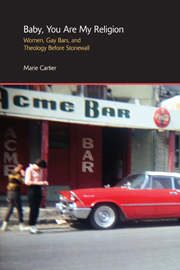Book contents
- Frontmatter
- Dedication
- Contents
- Acknowledgments
- Preface: Myrna's story
- 1 It was the only place
- Part I Interviews
- Part II Theological history and contexts
- Part III The nature of “theology”
- 9 Experience is primary
- 10 What is theelogy?
- 11 Four tenets of theelogy
- 12 Conclusion … Last Call!
- Appendix A Demographics
- Appendix B Sources
- Bibliography
- Index
9 - Experience is primary
from Part III - The nature of “theology”
- Frontmatter
- Dedication
- Contents
- Acknowledgments
- Preface: Myrna's story
- 1 It was the only place
- Part I Interviews
- Part II Theological history and contexts
- Part III The nature of “theology”
- 9 Experience is primary
- 10 What is theelogy?
- 11 Four tenets of theelogy
- 12 Conclusion … Last Call!
- Appendix A Demographics
- Appendix B Sources
- Bibliography
- Index
Summary
MYRNA'S STORY … CONTINUED
Myrna was married from 1953 to 1968 when she separated, and then divorced her husband in 1970 when no-fault divorce law passed in California. She had terrible insomnia throughout her marriage. “I would get up at one or two a.m. and I would call every gay bar I had the number to from the 1940s. I wouldn't say anything. I would just stay on the phone and listen to the sounds in the background. I would stay on until they hung up, and then I would call another one of my numbers, until I had called all the numbers I had. That was my lifeline.”
What did it mean to call those bars and to hear the sounds in the background? “That phone. Those numbers. That was my lifeline.” she whispered, and put both hands by her heart. “It meant there was a place somewhere-even if I couldn't go there—that place was out there. I could hear it. Freedom.” She called the bars two to three times a week like this—for fourteen years.
Why did hearing the sounds in the background of an anonymous phone call represent freedom? While the communities that coalesced around the gay girl bars in America from 1940–80 can be seen as religious communities through a sociological lens, they also created a community where they developed God and/or the sacred in one another. Three spirals of thought place this community and its gathering spaces—the bars—within contemporary theological method. These spirals are experience as primary; the historical gap in the use of language and a re-examination of the classic “Orders of Theological Construction.”
- Type
- Chapter
- Information
- Baby, You Are My ReligionWomen, Gay Bars, and Theology Before Stonewall, pp. 172 - 193Publisher: Acumen PublishingPrint publication year: 2013



